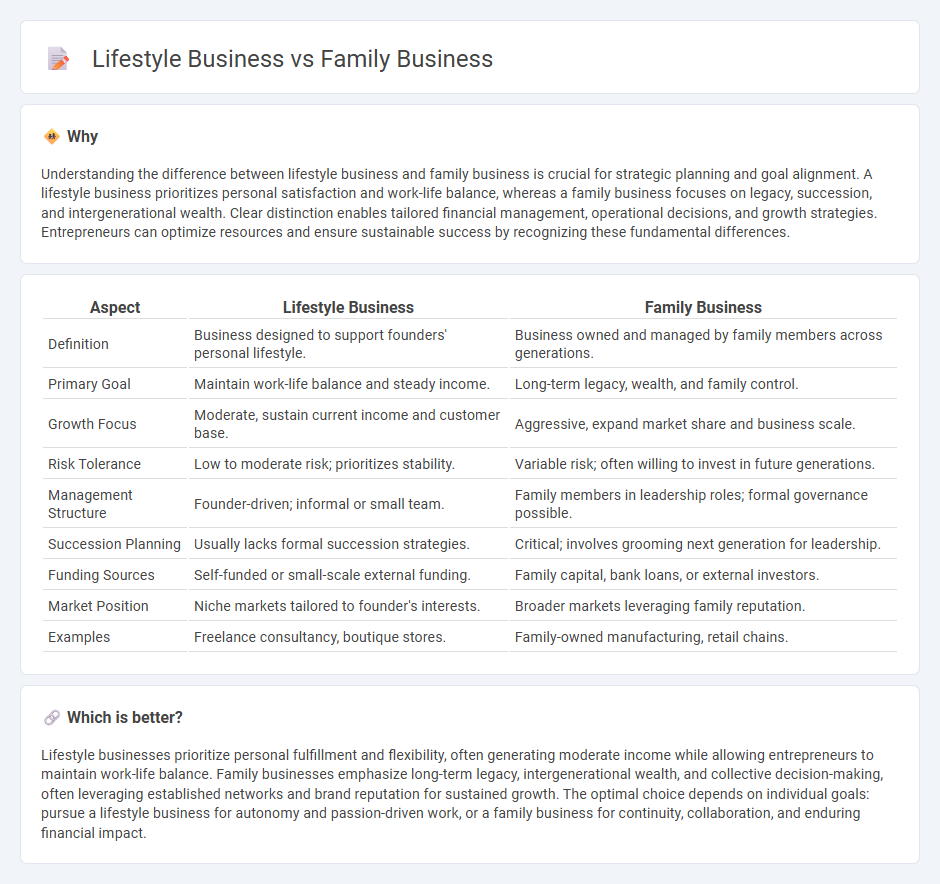
Lifestyle businesses prioritize personal freedom and work-life balance, often focusing on passion-driven ventures with scalable income tailored to individual goals. Family businesses emphasize long-term legacy, multigenerational wealth, and strong relational ties that drive decision-making and operational continuity. Explore the key differences and benefits of each to determine which entrepreneurial path aligns best with your ambitions.
Why it is important
Understanding the difference between lifestyle business and family business is crucial for strategic planning and goal alignment. A lifestyle business prioritizes personal satisfaction and work-life balance, whereas a family business focuses on legacy, succession, and intergenerational wealth. Clear distinction enables tailored financial management, operational decisions, and growth strategies. Entrepreneurs can optimize resources and ensure sustainable success by recognizing these fundamental differences.
Comparison Table
| Aspect | Lifestyle Business | Family Business |
|---|---|---|
| Definition | Business designed to support founders' personal lifestyle. | Business owned and managed by family members across generations. |
| Primary Goal | Maintain work-life balance and steady income. | Long-term legacy, wealth, and family control. |
| Growth Focus | Moderate, sustain current income and customer base. | Aggressive, expand market share and business scale. |
| Risk Tolerance | Low to moderate risk; prioritizes stability. | Variable risk; often willing to invest in future generations. |
| Management Structure | Founder-driven; informal or small team. | Family members in leadership roles; formal governance possible. |
| Succession Planning | Usually lacks formal succession strategies. | Critical; involves grooming next generation for leadership. |
| Funding Sources | Self-funded or small-scale external funding. | Family capital, bank loans, or external investors. |
| Market Position | Niche markets tailored to founder's interests. | Broader markets leveraging family reputation. |
| Examples | Freelance consultancy, boutique stores. | Family-owned manufacturing, retail chains. |
Which is better?
Lifestyle businesses prioritize personal fulfillment and flexibility, often generating moderate income while allowing entrepreneurs to maintain work-life balance. Family businesses emphasize long-term legacy, intergenerational wealth, and collective decision-making, often leveraging established networks and brand reputation for sustained growth. The optimal choice depends on individual goals: pursue a lifestyle business for autonomy and passion-driven work, or a family business for continuity, collaboration, and enduring financial impact.
Connection
Lifestyle businesses and family businesses are interconnected through their shared emphasis on personal values, flexible work-life balance, and long-term sustainability rather than rapid growth or external investment. Both business types often prioritize legacy, customer relationships, and community impact, aligning entrepreneurial goals with family priorities and lifestyle choices. This synergy fosters resilience and continuity, making entrepreneurship deeply rooted in personal and familial contexts.
Key Terms
Family business:
Family businesses prioritize long-term succession planning and preserving family values alongside profitability, often leading to multi-generational ownership and deep-rooted community ties. These businesses balance professional management with family involvement, creating unique governance structures to mitigate conflicts and sustain growth. Explore detailed strategies and real-world examples to understand how family businesses achieve enduring success.
Succession
Family businesses prioritize long-term succession planning to ensure smooth generational transitions and preserve legacy, often involving complex governance structures and emotional dynamics. Lifestyle businesses focus on maintaining the founder's preferred work-life balance with simpler succession needs, commonly transferring operations through informal arrangements or selling. Explore effective strategies to navigate succession challenges in both family and lifestyle businesses.
Governance
Family businesses prioritize structured governance to balance family interests with business objectives, often implementing family councils, boards, and formal succession plans to ensure continuity and stability. Lifestyle businesses tend to have informal governance, with decisions driven by personal goals and flexibility rather than rigid structures. Explore more on how governance models impact the success and sustainability of these business types.
Source and External Links
Family business - A family business is a commercial organization where management decisions are influenced by multiple generations of a family, making it the oldest and most common economic model worldwide.
Family Business Beer Company - A family-owned and operated brewery near Austin, Texas, offering award-winning beers and focusing on distribution throughout Texas.
The Family Business (American TV series) - A crime family drama about the Duncans, who run an exotic car dealership by day and live a secret dangerous life by night.
 dowidth.com
dowidth.com